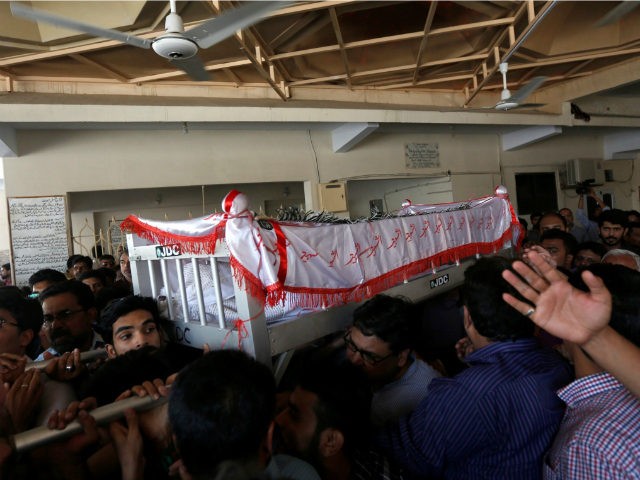The Hakeemullah group, a branch of the Pakistani Taliban, has claimed responsibility for killing a renowned activist in Pakistan’s Karachi region who was known for speaking out against jihadist groups, Reuters has learned.
However, Reuters acknowledges that “the police could not verify the Hakeemullah faction’s claim, and said the group has previously taken responsibility for attacks it did not carry out in Karachi, a teeming metropolis of 20 million people that is known for its complex mix of ethnic, sectarian and political violence.”
Khurram Zaki, described by Reuters as a “Pakistani rights activist known for his outspoken stance against the Taliban and other radical Islamist groups,” was reportedly killed by gunmen late on Saturday night “at an outdoor cafe in central Karachi while a companion was wounded.”
“Zaki was sitting at a cafe where he was targeted by four armed men arriving on two motorcycles,” reportedly said Muqadas Haider, a senior police officer.
Early this year, the Islamabad-based Center for Research and Security Studies (CRSS) reported that Karachi, Pakistan’s largest city, “remained the most violence-affected region in the country” in 2015, “topping even the restive tribal district of North Waziristan,” according to The News International.
North Waziristan lies along the Afghanistan-Pakistan border and serves as a safe haven for the Taliban and its affiliates, al-Qaeda and the Haqqani Network.
In a phone call to Reuters, the Hakeemullah group claimed responsibility for killing Zaki, saying the outspoken activist “had been targeted for his stance against radical cleric Abdul Aziz.”
Aziz is the infamous Islamic State (ISIS/ISIL) supporter and radical cleric of the Taliban-aligned Lal Masjid (Red Mosque) in Islamabad, one of Pakistan’s most notorious mosques and religious schools (madrassas).
Zaki, the murdered Pakistani activist, was known for his outspoken stance against Aziz and various Islamic extremist groups, including Lashkar-e-Jhangvi, a Sunni jihadist group, and the Pakistani Taliban, officially known as Tehrik-e Taliban Pakistan (TTP).
“In December 2015, Zaki lead street protests against Aziz, demanding the cleric be arrested and charged with hate speech for allegedly justifying attacks,” such as the Taliban-perpetrated massacre at a school in Peshawar, Pakistan that left around 150 people dead, including over 140 children, notes Reuters.
“In 2007, Aziz and his followers were engaged in an armed standoff with government forces at his mosque in the capital Islamabad, culminating in a eight-day military operation that saw Pakistani commandos raid the mosque,” it adds.
Reuters learned from Jibran Nasir, Zaki’s fellow activist who was also involved in protests against Aziz, that the Pakistani activist confided to friends that he was on several jihadi “hit lists.”
Nasir told Reuters that Zaki failed to specifically say which jihadist groups had threatened him.
Zaki had been “a target of a systematic hate campaign” by an Islamist political leader and Lashkar-e-Jhangvi, reportedly revealed a statement released after his death by a website the activist helped run.
In December 2014, a court in Pakistan issued an arrest warrant for Aziz after he suggested the Peshawar school massacre was a justifiable reaction to the Pakistani military’s “un-Islamic” operation against jihadists in the North Waziristan region.
Nevertheless, although a police station in Islamabad “has two First Information Reports registered against him for provocation and threatening the civil society,” the Pakistani government “insists that Aziz cannot be detained, owing to a lack of charges,” reported Al Jazeera in February of this year.
Despite his repeated calls for the overthrow of the Pakistani government and for sharia law to be imposed, Aziz has been exonerated of all criminal charges by the Pakistani judicial system.
“Targeted killings are common in Karachi, although violence has declined significantly since the launch of a paramilitary operation in the city almost three years ago,” declares Reuters. “Rights activists are increasingly among those targeted in Karachi.”
The group that claimed responsibility for killing Zaki appears to have taken its name from the former top leader of the al-Qaeda-linked TTP, Hakeemullah Mehsud, the man behind the failed 2011 bomb attack in Times Square. He was killed by a U.S. drone in 2013.

COMMENTS
Please let us know if you're having issues with commenting.